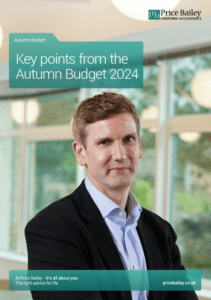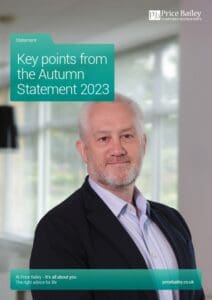Spring Statement 2025
Download our summary of the Spring Statement
Spring Statement 2025
On 26 March 2025, The Chancellor of the Exchequer, Rachel Reeves, delivered the Spring Statement. Our summary of the statement covers all the key points and is available to download now.
Much of the Spring Statement focused on growth, with The Chancellor outlining her plans for things such as national defence, welfare, infrastructure.
Keep an eye out for our analysis, opinions and insights in upcoming posts and articles on the 2025 Spring Statement over the coming days and weeks.
Download your 2025 Spring Statement summary
 Price Bailey is always here to share our experiences and knowledge with you, and your 2025 Spring Statement summary is here to help.
Price Bailey is always here to share our experiences and knowledge with you, and your 2025 Spring Statement summary is here to help.
If you have any specific questions about how the Spring Statement might impact your business, get in touch using the form below.
We always recommend that you seek advice from a suitably qualified adviser before taking any action. The information in this article only serves as a guide and no responsibility for loss occasioned by any person acting or refraining from action as a result of this material can be accepted by the authors or the firm.
Previous Budgets and Statements
Download your 2024 Autumn Budget
Autumn Budget summary 2024
On 30 October 2024, the new Labour Government announced their Autumn Budget.
The Chancellor of the Exchequer, Rachel Reeves, delivered her first Budget yesterday after the general election. Our summary of the Budget covers all the key points and is available to download now.
Download your 2024 Autumn Budget summary
 Price Bailey is always here to share our experiences and knowledge with you, and your 2024 Autumn Budget summary is here to help.
Price Bailey is always here to share our experiences and knowledge with you, and your 2024 Autumn Budget summary is here to help.
If you have any specific questions about how the Spring Budget might impact your business, get in touch using the form below.
Download your 2024 Spring Budget
Spring Budget summary 2024
On 6 March 2024, the Government Government announced their Spring Budget.
The Chancellor of the Exchequer Jeremy Hunt delivered the Spring Budget yesterday after an updated economic forecast from the Office for Budget Responsibility.
Our summary covers all the key points and is available to download now.
Keep an eye out for our insights for upcoming posts about the 2024 Spring Budget over the following weeks.
Download your 2024 Spring Budget summary
 Price Bailey is always here to share our experiences and knowledge with you, and your 2024 Spring Budget summary is here to help.
Price Bailey is always here to share our experiences and knowledge with you, and your 2024 Spring Budget summary is here to help.
If you have any specific questions about how the Spring Budget might impact your business, get in touch using the form below.
Download your 2023 Autumn Statement
On 22 November 2023, The Chancellor of the Exchequer Jeremy Hunt delivered the ‘Autumn Statement for Growth’. The Chancellor is keen to stimulate economic growth and highlighted 110 measures for businesses. In addition, there were significant statements relating to National Insurance changes and also the reform of work-related state benefits.
Our summary covers all the key points and is available to download now.
Download your 2023 Autumn Statement summary
 Price Bailey is always here to share our experiences and knowledge with you, and your 2023 Autumn Statement summary is here to help.
Price Bailey is always here to share our experiences and knowledge with you, and your 2023 Autumn Statement summary is here to help.
If you have any specific questions about how the Autumn Statement might impact your business, get in touch using the form below.
Download your 2022 Spring Statement
Against a backdrop of rising inflation, Chancellor Rishi Sunak presented his first Spring Statement on Wednesday 23 March 2022.
In his Spring Statement, the Chancellor announced a cut in fuel duty for petrol and diesel as he sought to ease the impact of rising prices for households and businesses. The Chancellor will lift the starting thresholds for National Insurance contributions (NICs). He also pledged a cut to income tax in 2024. However, the Health and Social Care Levy will still be implemented in April 2022. For businesses, there is an increase to the Employment Allowance, as well as relief from business rates on a range of green technologies and help with training and the adoption of digital technology.
According to Gemma Thake, a Director in the Tax team at Price Bailey, R&D tax relief was also a key feature of the Spring Statement for companies. It was announced that relief would be extended from April 2023 to cover R&D underpinned by pure mathematics, which is likely to be of particular interest to emerging sectors such as AI and robotics, as well as established businesses in manufacturing and design. Other “reforms” were also confirmed to extend the definition of qualifying expenditure to include all cloud costs associated with R&D and restrict R&D costs incurred overseas, unless there is a material or regulatory exception. Draft legislation is expected to be published this summer.
Download your 2022 Spring Statement summary
Price Bailey is always here to share our experiences and knowledge with you and your 2022 Spring Statement summary is here to help.
If you have any questions specific questions about how the Spring Statement might impact your business, get in touch using the form below.
Have a question about the Statement? Ask a member of the team...
Sign up to receive exclusive business insights
Join our community of industry leaders and receive exclusive reports, early event access, and expert advice to stay ahead – all delivered straight to your inbox.
We can help
Contact us today to find out more about how we can help you

